Meditating at the Piteous Gate
Keywords: album review, Alexander Iadarola, lp, M.E.S.H., Nora N. Khan, PAN Records, Piteous Gate, speculative fiction
Alexander Iadarola & Nora N. Khan review M.E.S.H.'s Piteous Gate LP, released on PAN Records
Alexander Iadarola & Nora N. Khan review M.E.S.H.’s Piteous Gate LP, released on PAN Records
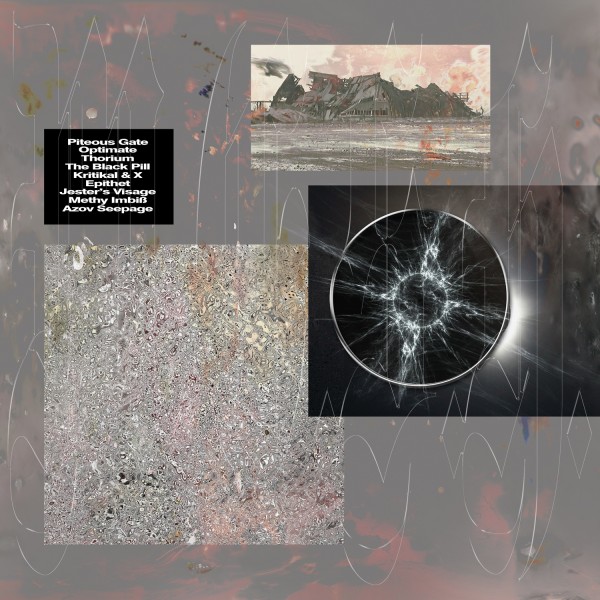
M.E.S.H. – Piteous Gate (PAN 66)
The M.E.S.H. aesthetic might be described as an effort to reconcile competing modes of thought and activity. James Whipple tries to find focus and meaning in an intentionally created constellation of inimical processes, divergent histories and seemingly irreconcilable imagery.
“I wanted to create a sense of focus that can come from following two divergent lines of thought that eventually converge again in unexpected ways,” he said in FADER, recently, speaking of his debut LP, Piteous Gate, which will release on July 17th. He was specifically elaborating on how he built “Epithet,” a teaser track, “from two very different rhythmic speeds played on the same grid and made to fit together through syncopation.” In fact, for M.E.S.H., this exceptional effort to find focus and sense in tension between dual strains is not just an aesthetic, but a practice.
The practice has been previously exercised by artists like Ryoji Ikeda. In his piece Superposition, Ikeda ran multiple visual scripts side by side: rapidly scrolling slides of newspaper excerpts and data under a microfiche, multiple screens of airplane footage over competing landscapes, aerial shots of the Gobi alongside the Amazon. In watching such divergent processes (content, form) at blistering speed, the viewer is forced, instinctually, to create some mental resolution of the two.
The aural version of this process is even more hardwired to sensory disorientation. Where discontinuity in Ikeda’s work emerges from our failure to cognitively process heavy doses of representational context-specificity, Piteous Gate aims for a more affectively coded misdirection. This misdirection certainly functions on the level of representation; it also runs mainlined into one’s muscles and nerves, working within electronic music’s economy of sensual, embodied feeling.
In his run-up to Piteous Gate, M.E.S.H. has made his presence known through well-received mixes and EPs like 2014’s Scythians. His online presence has been very important, as well, helping his fans glimpse his intellectual and (relatively leftfield) leisurely interests. He comes across as politically invested, but communicates this engagement ambivalently through a quiet and gleeful cartooning of the world. The purpose of this distinct element of cartooning remains fixedly ambiguous, as it is neither explicit idealization, nor caricature.
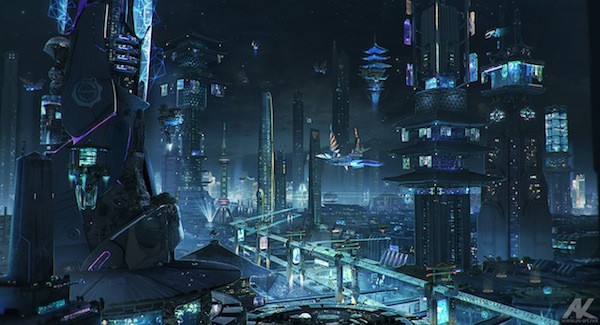
Shanghai 2.0 – Adam Kuczek
Scythian warriors, red pills versus ‘black pills’, hints of the deep Web and ancient forums, the Jester’s Visage, Eurasian battles, retro games, gestures at geopolitical intrigue, arcane lore, plots grafted from science-fiction and fantasy: Whipple’s weird mix of references and symbols feel like they were forged in a Hephaestus-like corner of the Internet. These surrealist images toggle back and forth between the deep past and remote future, and the ranges of affect from each. This bubbling layer of often hilarious digital output informs our listening, imagining, and interpretation of Piteous Gate.
PG is also driven by opening up portals to often competing modes of history. Sounds of the Renaissance and Baroque are interwoven with hi-tech, protean synthesis on “The Black Pill.” On “Kritikal and X,” the sensual, glittering neon of ‘90s cyber-drama is run through a DAW digestive system of processing, while the industrial, glistening, title track references an enigmatic scene from Gene Wolf’s 1980 science fantasy novel The Shadow of the Torturer. M.E.S.H. easily moves from one reference to another, drawing one into the next with aleatoric passes. These flows first hang cryptically in irresolution, then breathe together to co-inhabit the space of the album.
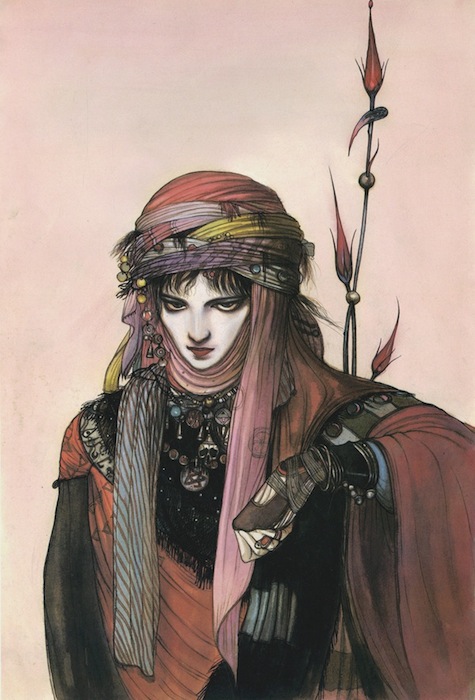
Yoshitaka Amano
Through his usage of cartooning, M.E.S.H. distributes and recodes the confrontation with political realities into a wry, teasing, and eerie cast of characters and objects. Lauren Berlant writes that cartoons may function to “disperse the heavy comportment” of the unpleasurable or unbearable “into a rhythm and a game,” and that is certainly their function here. Despite their opaque connotations, these figures haunt the listener both with what they come to mean, and also, with what they threaten to withhold in undisclosed meaning.
In repeat listens, we are invited to practice M.E.S.H.’s own studied work to reconcile modes as a type of cognitive exercise. We tried to practice this reconciliation, ourselves, while listening to each track.
“Piteous Gate,” the title track, opens with a sick lurch of the mining ship, halted in its comb of steaming wet sands and boiling sinkholes. It shakily recoils from the rip, a red dent in the ground: an unknown metal’s been hit. A flood of unknown liquid in a rapid stream, crossing the ship’s path. Blue light pulses, phasing in time with the whirr of the engine, stuttering in syncopation. Metal whips thrash the ground. The ship grips rocks, desperately pushes and twists back in retreat, cranes and arms retracting, lifting rapidly, bright and chrome against the black.
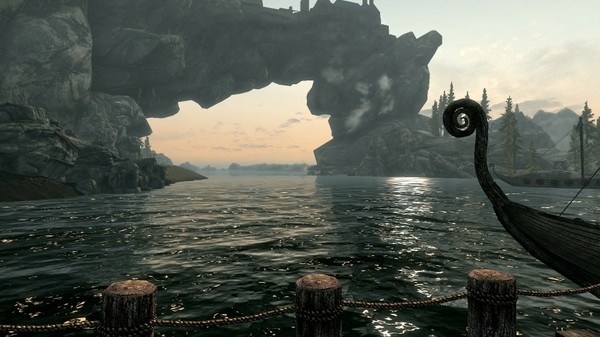
Landscape imagery from Elder Scrolls Skyrim
A warning signal is sent to the station, several intervals away. At the far end of a long hallway, a woman lights a flare: pink, neon, dim. Short falls of sparks at her side. She moves down the hall towards us, doors opening on either side of her as she passes. More flares are lit, and the hall fills with sharp and acidic smoke. The space opera takes a turn into dystopian quadrants.
In “Optimate”: a thrashing violence. Grifters on the roof fling a bundle of metal scraps down into the narrow alley below. They drag, feverishly bundle. We hear a clattering down into the troughs. Here: a silver thread of electromagnetic interference, trawling of interstitial transmissions from a remote tower, catching signals, taps, urgent communiqués. Zooming out now: a tightening, all these scraps in grey, coalescing. Out of that tension, above the alleys, a court melody snakes it way through the frenetic blip signal, bringing with it the memory or a foreshadowing of milder times. An 8-bit baroque masquerade; ladies and bizarre, cryptic intrigue. A glimpse of the Jester’s face through the moving bodies. All these images remembered later in a time-blur, while passing in and out of sleep in the steamroom. Then, dreams of dalliances in the meadow; extended, Elysian fields in creamy luster. Lowering, not by gravity but down, nonetheless, cloudstrokes heaving, Risset tone psychology…
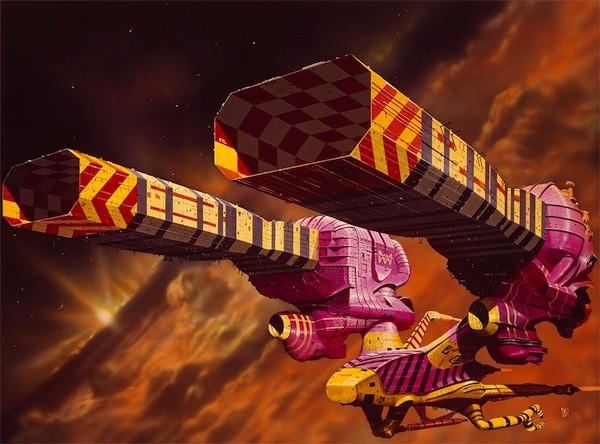
concept art for Jodorowsky’s Dune
In “Thorium,” we are perched inside a gold-and-orange Jodoroswky cylinder, leaving a wake of static as it accelerates towards the mining planet. Bells and drums are set in warning, and the grounded ship’s captain stands motionless, muttering, “I’m just trying to get a sense of how, of what, of where…” as he watches the cylinder’s sharp shadows slipping across the carpet like they have their own life. The red stripe they’d hit is the crest of a repository holding strategic fuels. The timer’s been set off.
Light hammering, some kind of makeshift dock built shallow in the sand. Pressed for answers, attempting repair, the crew assembles and dissembles in panic. They can’t be too sure it’ll hold, but they’re moving quickly here. Captain’s slipping: visions of the dance, velvety, time in suspension. That it happened this soon is unbelievable, and he collapses into his chair, barely hearing them screaming in his ear for direction. The Jester’s begun strumming, sure, quiet, and insistent. The damaged ship exhales. It’s too late, already. He waves them off.
The encounter with Piteous Gate is beginning, though one flashback persists, distracting: set against the sky, far up in the hills, raving shapes glistening in the cold light. We know that the switch has flipped and the paint’s peeling back.
“Black Pill” is ambience for plot enactment, taking us to a third place in a form of aural parataxis. A melancholic, contemplative strumming—the Jester’s, perched above the clouds—floats atop an atmospheric, medieval open-world game, where news of all the upheaval hasn’t hit, just yet.
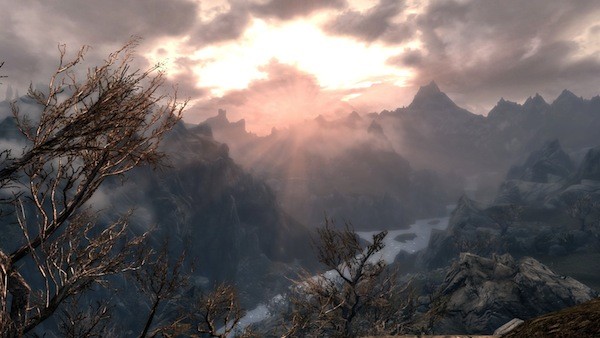
We flow into a virtual mountainscape, where a heroine wanders, stumbles, picks through unfamiliar, rambling terrain. She has brief glimpses, through low clouds, of the dark grey outline of ranges beyond. A quest lingers just outside the immediate frame, a reason for edging along the next craggy abyss.
Like the famous soundtracks of Skyrim or Oblivion, “Black Pill” allows for gauzy and unfocused, but productive, thinking. Orchestral atmospherics, shot through with bittersweet yearning and of course, nostalgia, for a future we were supposed to have, or a past that we would have been better suited for. All the heartbreak of earnest human striving ghosting the player, the listener, as she interacts with the narrative world, and mourns her actions in her own world.
With “Kritikal and X,” the intermission begins: a cloth unfurls, and it bears a text:
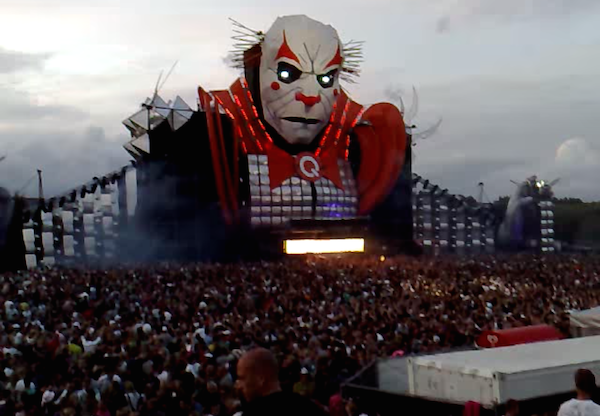
The Jester’s drunk again
Stumbling down the cobblestone path
Leading through the city like crammed, nasty tubes, funneling in knots
Walks past some youths airing their beef
“Why’d you take it so seriously,” one asks another
The fine line is crossed, and
The Jester stumbles on into purple night
In shadowy corners, he fixes his bell-sewn hat
Sadly fingers the spades on his pants
Sits down in the sewer and cries ‘til morning
The opening of “Epithet” slides us into a glittering Byzantium, where we’re cradled by warm waters, released from columns in the baths, open to the night air. We see harpists by each pool as we survey its rooms. Being here is like hearing a muted warning in a dream.
Percussive bashing that begins to tear the fabric of the scene, carried on cycles of wind, shuttling us into violence of the present. A messenger batters fists against a door in a rainstorm, trying to let us know of some urgent, terrible thing.
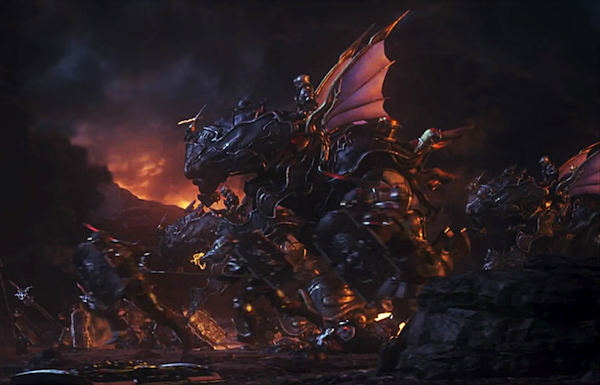
Our heroine is startled awake, and her serotonin hits refrain in anticipation. She centers focus, preparing for departure. She sits at the table and watches brown clouds gust across the zone, but there’s also an ominous, lighter vapor, moving slower, and hard to identify: the two phase.
Looking down, tethering hardstyle scraps, pouring and mixing sparkling, liquified metals in rations for the meeting at Piteous Gate. She saddles up: hollow spokes tapping, galvanized steel becoming horses. The refrain hits harder, phasing with itself again, glowing now, even. The highway melts past.
In the “Jester’s Visage,” the Jester sits on a stoop, sadly strumming, drying his red eyes. He is tinkering, exploring, picking up instruments, slowly becoming instrumental himself. Renaissance harp samples plucked through a MIDI keyboard. He plays, while facing a toxic sunset, hues surreal: self-realization through experimentation.
Consider The Jester: possibly a reference to a game character; or, a 9/11 conspiracy online forum; or, a cryptic, scarring video on Youtube of a crude-graphick’d jester, in flames, whose “horrid visage” we must confront. Whether a real reference, or a new symbol pulled out of Whipple’s own personal mythos, one thing is sure: the Jester laments, and no one is ever ready to face him.
“Methy Imbiß” starts with a staggering, gasp-inducing, hydraulic pull. Something has been pulled up from one of the plots. Drawn back too fast, inhuman flesh leaking, it starts tumbling, still, horribly, alive. Head over heels through one garden, then a whole block. It’s pulling up moist, brown soil and curled weeds, ripping through fences of abandoned homes. Time bleeds. It comes to a rest some hours later. We find a corpse propped against a backyard shed, pumped up with different kinds of helium. Birds chirp and laugh. The drumming around doubles into itself, ripping off tangents and tossing them into the wind.
“Azov Seepage” sounds wholly, unapologetically evil. Mecha’s fallen to the ground after being spun around a thousand times in space, purified: sheets of metal that could span miles end to end, now dead weight, shed, after they harnessed its most coherent edifice.
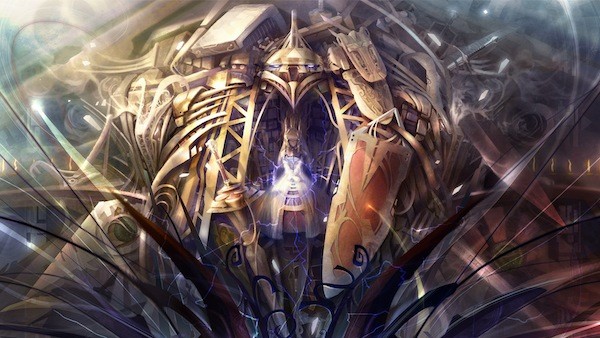
A machine consciousness, its eye sweeping the landscape for threats, scanning from the furthest left point of the horizon to the furthest right.
It spindles lankily, bobbing along, climbing up and down boulders, tumbling down pine-laden hillsides, then reconstituting itself. But here, from below, this close, it is total, unremitting. You can’t see its edges, and it doesn’t see you. It pauses, braces, and looks into the sun, then, towards a blank space beyond the sun. In the cockpit, tiny, smiling: the Jester.
These tracks are ambient in the truest sense. These are the sounds of suspension, of stasis in open space, what Lacoue-Labarthe, following Hölderlin, called “empty time,” or caesura. “The disarticulation represents the active neutrality of the interval between,” he writes. “This is undoubtedly why it is not by chance that the caesura is, on each occasion, the empty moment…”
In previous M.E.S.H. tracks like “Scythians” or “Imperial Sewers,” impact hit when disjunctive elements coalesced in surprising ways. That release is continuously withheld on Piteous Gate: in place of cohesion, there is instead a distinct feeling of undoing, making for empty moments.
And following Berlant, the undoing encounter is not always a productive one; some of the tracks feel like we are moving backwards, with propulsion skipping back in recursive loops. The undoing moves us to interrogate the relationality of meaning.
In the record’s pairing of divergent histories and paradigms, the gaps in between aren’t disavowed, smoothed over, or erased through homogenizing gestures. Instead, their irreconciliation is let to sit, as is. Within these suspended, empty moments is an encounter, a confrontation, both with awe and dread, with the banal and the enthralling.